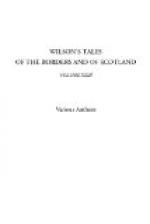“Ay, ay,” replied Tammas, as he began to come to a proper condition of perceiving and thinking; “and it was you, then, wha was here this morning?”
“No, no,” replied she; “I have not been here for seven long years, even since that terrible night when you pushed Janet into the North Loch.”
“And may Heaven and its angels hae mercy upon me!” ejaculated he.
“Aiblins they may,” said she, “for your purpose was defeated; yea, even by that Heaven and thae angels.”
“What mean you, woman?” cried the astonished man. “What, in the name o’ a’ that’s gude on earth and holy in heaven, do ye mean?”
“Just that Janet Dodds is at this hour a leevin’ woman,” was the reply.
“The Lord be thanked!” cried Tammas again, “for ’He preserveth all them that love Him.’”
“‘But all the wicked He will destroy,’” returned she; “and surely it was wicked to try to drown sae faithful a wife and sae gude a Christian.”
“Wicked!” rejoined he, in rising agony. “’Let the righteous smite me, it shall be a kindness; and let them reprove me, it shall,’ as Solomon says, ‘be an excellent oil.’”
“I am glad,” continued the woman, “to find you with a turned heart; but whaur is the Jezebel ye took in her place?”
“Awa this day,” replied he. “I have found her out, and never mair is she wife o’ mine.”
“Sae far weel and better,” said she.
“Ay, but speak to me o’ Janet,” cried he, earnestly. “Come, tell me how she escaped, whaur she is, and how she is; for now I think there is light breaking through the fearfu’ cloud.”
“Light indeed,” continued Mrs. Paterson; “and now, listen to a strange tale, mair wonderfu’ than man’s brain ever conceived. When ye thought ye had drowned her, and cared naething doubtless—for ye see I maun speak plain—whether her spirit went to the ae place or the ither, ay, and ran awa to add to murder a lee, she struggled out o’ the deep, yea—
‘He took her from the fearfu’
pit,
And from the miry clay.’
And when she got to the bank she ran as for the little life was in her, until she came to the foot of Halkerstone’s Wynd, where she crossed to the other side of the loch. When she thought hersel’ safe, she took the road to Glasgow, where I was then living wi’ my husband, wha is since dead. The night was dark, but self-preservation maks nae gobs at dangers; so on she went, till in the grey morning she made up to the Glasgow carrier, wha agreed to gie her a cast even to the end o’ his journey. It was the next night when she arrived at my door, cold and hungry, and, what was waur, sair and sick at heart. She told me the hail story as weel as she could for sobs and greeting; for the thought aye rugged at her heart that the man she had liked sae weel, and had toiled for night and day, should hae turned out to be the murderer o’ his ain wife.”
“And weel it might hae rugged and rugged,” ejaculated Tammas.




